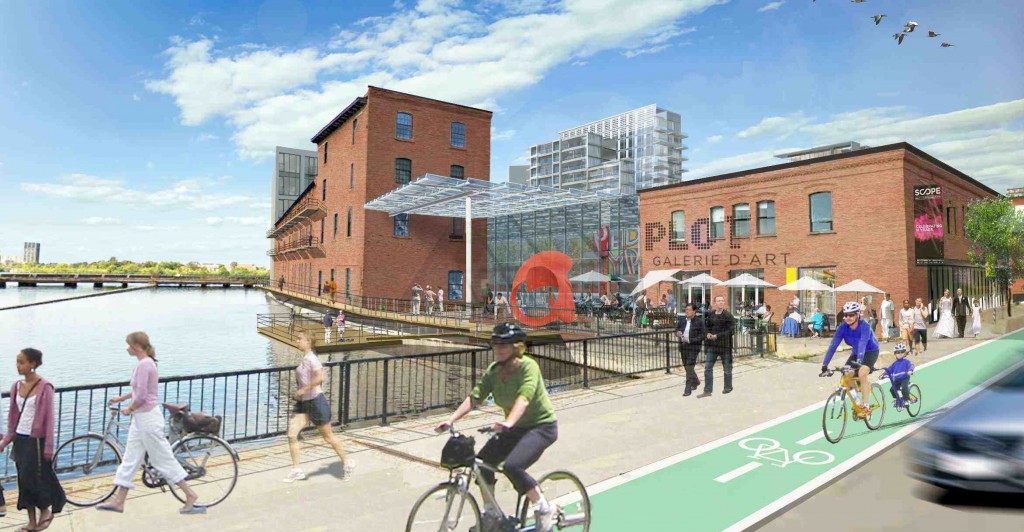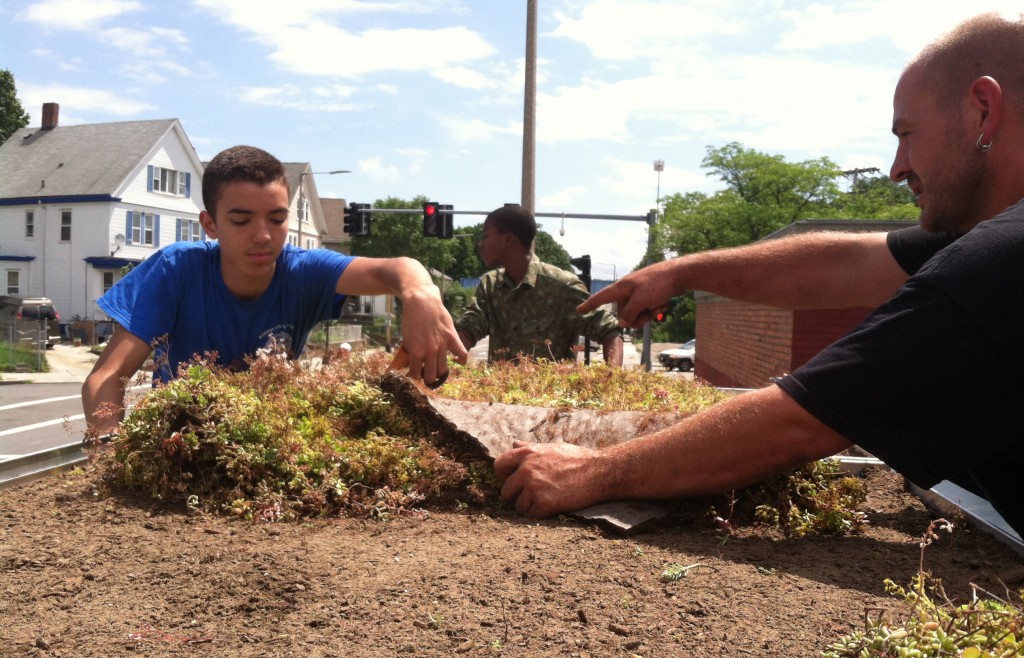This week, our CEO Rob Bennett is once again at the Clinton Global Initiative (CGI) America gathering in Denver, CO.
Last year, EcoDistricts was awarded the opportunity to launch our national Target Cities pilot program on the world-renowned CGI stage. Our CEO, Rob Bennett, joined many other leaders and organizations on stage to announce EcoDistricts’ commitment towards building just, sustainable and resilient communities for all.
[youtube id=”8yJJIhfFD_g” align=”center” mode=”normal” autoplay=”no” maxwidth=”800″]
Now, as we head into year 2 of the Target Cities pilot program, we recognize how important it is to reflect on and share what we are learning about neighborhood-scale sustainable development, while also celebrating the incremental accomplishments of our project teams.
We initially launched Target Cities in nine neighborhoods across eight cities in North America. After our commitment on the CGI stage, we added Austin’s Seaholm District as another Target Cities pilot. And today, one year out from CGI, we are excited to welcome Detroit’s Eco-D team as our eleventh pilot project.
Development is happening in Detroit, and Eco-D, an initiative formed out of the Detroit Future City Framework, is working to make sure it is done justly and sustainably in a diverse set of neighborhoods. Eco-D is currently working with 6 neighborhoods across Detroit, and is focusing on creating the partnerships and processes to deliver successful results. Thanks to funding from the Kresge Foundation, Eco-D will now receive two years of guidance and collaboration with EcoDistricts and our Target Cities partners.
One thing that we at EcoDistricts have been clear about from the very beginning is that it is going to take collaboration to build vibrant and thriving communities where everyone can work, play and live. Kicking-off our program at CGI helped us to cultivate new strategic partnerships and reaffirm old ones in order to deliver on our commitment and achieve our mission. From the start, we have stressed to projects that the neighborhoods that are most successful in achieving their district-scale goals are those that bring together the public, private and civic sectors in decision making roles and responsibilities for the overall management of the neighborhood. Through education and orientation to concepts like collective impact and processes like collaborative governance, we have seen our Target Cities partners, like Eco-D, advance mutually beneficial collaborations that will only help to deepen their work and outcomes.

Zibi is a brownfield redevelopment project being led by Windmill Development Group. This interprovincial site sits between two cities and two provinces that speak two languages – French and English. Located on an island, Zibi connects to Ottawa and Gatineau by an interprovincial bridge engineered to transport goods back and forth between Ontario and Quebec. The Windmill Development Group embraced a collaborative governance process, supported by the Policy Consensus Initiative, to determine the best strategies and design for redeveloping the Booth-Eddy Corridor to work for the federal government as the main property owner. By bringing the various bridge stakeholders together, Windmill Development Group was successful in facilitating a process that produced the best outcomes that all of the stakeholders could support and buy into.
Like Zibi, many of our other projects have embraced the collaboration and formed strategic partnerships to deliver on the goals of their neighborhood:
- The Elizabeths-Congress Heights Ecodistrict in Washington, D.C. decided to use their planning process as an opportunity to break out of the typical government agencies silos to come together and work across 20 distinct agencies to collectively set the goals, vision and projects for the neighborhood.
- The Denver Housing Authority in the Sun Valley neighborhood of Denver, CO has also experienced great outcomes in creating an open and transparent Master Planning process that invites the community to help collectively set the vision for the future redevelopment of their neighborhood.
One of our biggest points of reflections since launching the program is that neighborhoods are able to be more effective and advance work more quickly if they have active participation from their local city leaders and public agencies. Some neighborhoods are able to vision and implement cheaper and quicker sustainability projects by using volunteer hours and donating resources. But some projects, like recycled water systems or district heating and cooling systems, are more technical and require specialized expertise. Whether it is a piece of legislation by a local policy maker or information from the planning department or public works, the city is key to understanding the parameters of what is feasible for a district scale project. City representatives can also be a key resource in helping to update laws and regulations to remove the barriers that impede some communities from achieving their sustainability goals. For the Talbot Norfolk Triangle Eco-Innovation District in the Codman Square neighborhood of Boston, the City of Boston and the Boston Redevelopment Authority have been key leaders in assisting the Codman Square Neighborhood Development Corporation in scoping out a community shared solar program for phased implementation later this year.

Another key observation that we have made over the past year is that it takes a significant amount of capacity from invested stakeholders to support neighborhoods in achieving their Ecodistrict vision. Our program focuses on accelerating project implementation and requires both an “all hands on deck” approach and facilitation by a project manager. It is important to have a dedicated project manager rising out of bed every morning thinking about what needs to happen in the ecodistrict that day. Some of our projects have the ability to dedicate resources towards a program manager role and have been able to advance their work on a faster timeline. Still some other projects are innovative in how they achieve the deliverables for their neighborhood. Kendall Square in Cambridge, MA brought on a Linnean Solutions to manage their participation in the Target Cities program and the advance their ecodistrict goals. In addition to providing project management support, Linnean Solutions has helped to bring technical assistance and expertise to some of the more complex concepts and projects that the ecodistrict is pursuing. On the other hand, projects like Sustainable Little Tokyo have brought together a small team of 3 people working across different organizations to all contribute a portion of their time to the Target Cities program and delivering on certain aspects of their neighborhood sustainability plan.
The first year of Target Cities really focused in on supporting and guiding the project teams on how to build a solid foundation of committed and invested stakeholders, across sectors, that can help deliver on the mission and vision of the ecodistrict. We understand that establishing the trust and relationships that keep groups work together, even through challenging moments, takes time and intention. CGI helped to inspire and reaffirm our belief in the power or partnerships. As we look ahead to the final year of Target Cities, and the addition of Detroit to the program, we are eager to work with our local project teams to support them in leveraging their partnerships to deliver on sustainability projects designed to achieve equity and resilience while addressing climate change. We are thankful to be able to partner with CGI for the second year in a row, and look forward to what we are able to accomplish through our partnerships.
